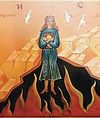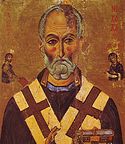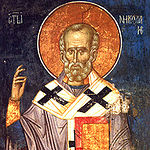

| Previous day | Next day |
| Old Style
July 29
|
Wednesday |
New Style
August 11
|
|
8th Week after Pentecost.
Tone 6.
Fast Day. |
Wine and oil allowed.
|
![]() Martyr Callinicus of Gangra, in Asia Minor (ca. 250).
Martyr Callinicus of Gangra, in Asia Minor (ca. 250).
Virgin-martyr Seraphima (Serapia) of Antioch (117-138). Nativity of St. Nicholas the Wonderworker, archbishop of Myra in Lycia (3rd. c.). Martyr Theodota and her three sons, in Bithynia (ca. 304). St. Lupus the Confessor, bishop of Troyes (Gaul) (479). Martyr Eustathius of Mtskheta, Georgia (589). Sts. Constantine and Cosmas, abbots, of Kosina (Stara Rus) (13th c.). St. Romanus, founder of Kirzhach Monastery, disciple of St. Sergius of Radonezh (1392). Martyr Daniel Kushnir of Mlievich (Ukraine) (1766).
New Hieromartyrs Seraphim (Bogoslovsky) and Theognostus (Pivovarov), hieromonks of a skete at Kyzyl-Zharskoe (Kazakhstan) (1921). New Hieromartyr Anatole (Smirnov), hieromonk and hermit of the Caucasus Mountains, Abkhazia (1930-1935). New Hieromartyr Pachomius (Rusin), hieromonk, of Alma Ata (Kazakhstan) (1938).
St. Theodosius the Younger, emperor (450). St. Constantine I, patriarch of Constantinople (676). St. Olaf, king of Norway (1030). Hieromartyr Bessarion of Smolyan, Bulgaria (1670).
Repose of Archpriest Georges Florovsky (1979).
Thoughts for Each Day of the Year
According to the Daily Church Readings from the Word of God
By St. Theophan the Recluse

Wednesday. [I. Cor. 10:12-22; Matt. 16:20-24]
When the Holy Apostles confessed the Saviour to be the Son of God, He said, I must…suffer…and be killed. The work had ripened; it remained only to complete it through the death on the cross. The same thing occurs in the course of a Christian’s moral progress. While he is struggling with his passions, the enemy still hopes somehow to tempt him; but when passions have settled down and the enemy no longer has enough power to awaken them, he presents external temptations, all sorts of wrongful accusations, moreover, the most sensitive. He tries to plant the thought: “So what did you work and struggle for? No good will come of it for you.” But when the enemy thus prepares a war from without, the Lord sends down the spirit of patience to his struggler, thereby preparing a lively readiness in his heart for all sorts of suffering and hostility before the enemy can manage to stir up trouble. As the Lord said about Himself, I must suffer, spiritual strugglers also feel a sort of thirst for sorrows. And when the suffering and hostility come, they meet them with joy, and drink them in like a thirsting man drinks cooling water.
Articles
 Martyr Callinicus of Gangra in Asia MinorThe Holy Martyr Callinicus, a native of Cilicia, was raised from childhood in the Christian Faith. |
 A Strange Miracle of St. Nicholas in 1956A true incident which shocked and brought repentance to hundreds of people in the Russian Soviet city of Kuibyshev (modern day Samara), in the year 1956. |
 Holy Passion-Bearer King Olav II of NorwayThere were many royal Olavs in Scandinavia, but none so glorious and holy as Olav Haraldson, successor to Olav Tryggvason (King Olav I of Norway). |
















